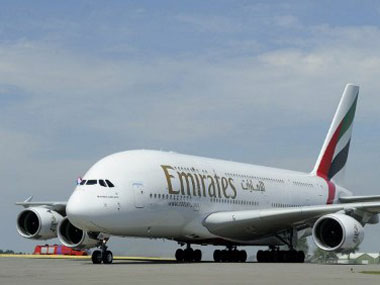United Arab Emirates is perhaps the only country in the world with which India has multiple bilateral air services agreements, emirate wise. The usual practice is for two countries to have only one such agreement which covers airlines operating from each country. But only in the case of UAE does India inexplicably ink such pacts separately with each emirate.
We have already seen how this discriminatory practice has bled Indian carriers - two of UAE’s largest airlines, Emirates and Etihad Airways - have been carrying Indians in droves to their respective hubs of Dubai and Abu Dhabi before providing them onward connections to the Americas and Europe. This, of course, has bled Indian airlines like Air India which could have carried this traffic had the Government not been generous with flying rights to the two UAE airlines with deep pockets.
[caption id=“attachment_87406” align=“alignleft” width=“380”]  Representational image: Reuters[/caption]
But a decision taken recently by Civil Aviation Minister A Gajapathi Raju may finally reverse this trend of fawning over foreign carriers, at the risk of putting our own airlines in trouble. A source says the ministry has rejected Air Arabia’s demand of being allowed to use flying rights accorded to the designated carrier of Ras Al Khaimah, an emirate of UAE. Ras al Khaimah’s own airline, RAK Airways, shut down last year after which the emirate petitioned India for allowing Air Arabia to operate 14,000 seats a week between itself and various Indian cities.
“We have rejected this proposal. Our Indian airlines are unable to use seats provided to them under bilateral pacts and this situation needs to be corrected. Air Arabia is the designated airline for Sharjah, why allow it to fly from Ras al Khaimah?,” this source said.
Not just Air Arabia, it seems the minister has been routinely denying any increase to other middle-eastern airlines as well. The source quoted above said Emirates wanted to increase its points of call in India but its request has also not been approved. As per a CAPA research report earlier this year, Emirates already operates to 10 Indian cities and in March this year, India and Dubai agreed to increase bilateral weekly seats between the two countries by 20% in phased manner.
This means from 55,284 seats a week prior to March 2014, 5500 fresh seats were added in this year’s summer schedule and another 3,300 added in the ongoing winter schedule. This takes total seats entitlements as of now to 64,084 per week between India and Dubai. Another 2200 seats will get added by the summer of 2015. Not all the additional seats may be used by Emirates though, some could also go to flyDubai.
India and Abu Dhabi have already signed on the dotted line for a phased but quantum jump in bilateral seat entitlements.
CAPA has noted that with the increase agreed upon for Dubai and Abu Dhabi, weekly entitlements to UAE carriers alone will incraese to 135,000 seats a week from 2015-16 and 26 Indian cities now feed passengers into various parts of the UAE. All European carriers combined get just 160,000 seats a week.
The source quoted earlier also said a similar request by Israel’s El Al airline, to increase ports of call in India, has also not been granted. He said there was a comprehensive review of all bilateral seat pacts in the works.


)
)
)
)
)
)
)
)
)



